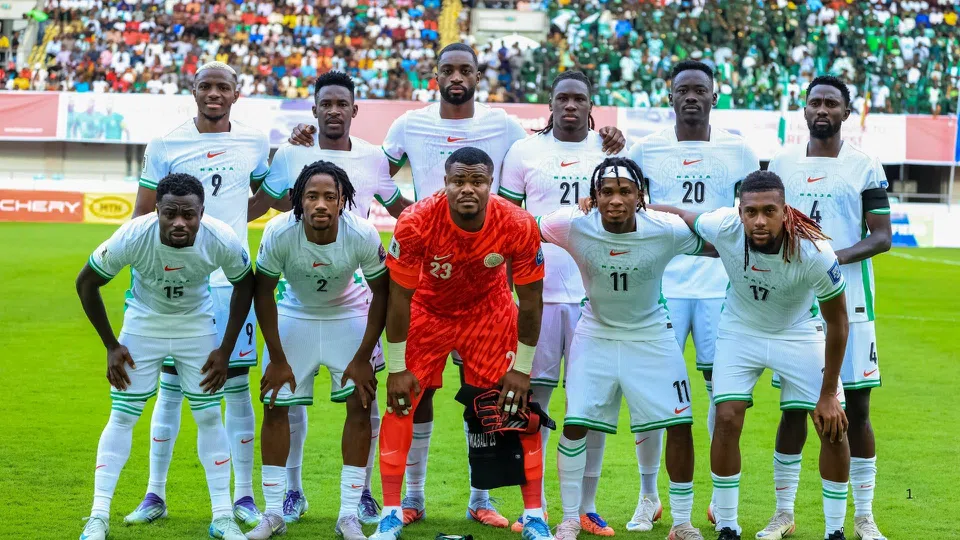In the 2026 FIFA World Cup Qualifiers Nigeria vs DR Congo playoff in Rabat, Nigeria’s World Cup dream slipped away in a match that blended early promise, grinding tension and a dramatic shootout that finished 4-3 to the Leopards after a 1-1 draw across 120 minutes.
This was not just a result, it was a story of fine margins, of missing stars and of choices that will be debated for months. Nigeria struck first through Frank Onyeka inside three minutes, then saw momentum ebb away after Meschak Elia punished a Wilfred Ndidi error before half time. From there, the Super Eagles wrestled with fatigue, pressure and a stubborn DR Congo side that grew stronger with every duel.
The early spark and the sudden shift
Nigeria’s start was almost perfect. Zaidu Sanusi delivered a clever cross that was flicked on and Onyeka finished, the ball deflecting on its way in. The stadium mood tilted green and white, yet Congo refused to blink and gradually pushed back. When Elia seized on Ndidi’s misplaced moment and equalised in the 34th minute, the tone of the evening changed, and Nigeria lost their grip on territory and rhythm.
From the restart onward, Congo took control of the physical battles. Former Super Eagles forward Victor Ikpeba captured it bluntly, noting that Nigeria lacked the energy that had carried them through previous rounds. His assessment would frame the post-match inquests that followed.
The shootout that sealed it
After extra time could not separate the sides, the night swung to a penalty shootout that felt like a referendum on nerve. Both teams missed two of their first five attempts. For Nigeria, Calvin Bassey and Moses Simon could not convert, while Jerome Akor, Bruno Onyemaechi and Chidera Ejuke scored their kicks. The decisive turn came when Semi Ajayi saw his effort saved, then DR Congo took their chance to clinch progress to the Intercontinental Playoff in Mexico.
It was harsh, it was dramatic, and it left a talented Super Eagles group staring at the thin line that separates jubilation from regret in international football.
The Osimhen factor that reshaped the contest
Everything Nigeria do in attack tends to orbit around Victor Osimhen, and his injury changed the complexion of the game. The striker, who entered the final on a hot streak with five goals in his two matches prior, was forced off after 45 minutes, which blunted Nigeria’s edge and emboldened DR Congo’s back line. The absence of the team’s talisman was more than statistical, it was psychological.
DR Congo defender Noah Sadiki acknowledged the impact openly.
“It’s not that it helped, but we know Osimhen is a big player and if you retire him out of the team, they have a big miss in front even though they have quality in front as well.”
In a match this tight, losing that threat mattered, and Congo sensed it.
The Ekong call and the bench debate
Another thread dominated the conversation after the final whistle. William Troost-Ekong, Nigeria’s designated first-choice penalty taker with a proven record, stayed on the bench for the entire match. Head coach Eric Chelle explained the decision, citing late defensive concerns and a tactical choice to introduce Chidozie Awaziem near the end of extra time. The coach added that a penalty session had been conducted the previous day, yet he stuck with his instincts in the moment.
Chelle told reporters,
“It was a choice because I felt that we were in danger during the last ten minutes, and that is why we put another defender on.”
He also reflected on the second guessing that inevitably follows defeat, adding,
“It is easy now to say maybe the best choice was the captain.”
He closed the topic with a forward-looking line, saying he had to focus on the next competition.
Troost-Ekong met the debate with typical calm and leadership. Asked if he was frustrated by not coming on late to take a kick, the captain replied,
“No, I don’t think I was. I wasn’t frustrated, I just wanted to win this game, no matter how.”
He affirmed he would have stepped up had he been on the pitch, and he leaned into the collective ethos, noting it was also important for others to gain that high-pressure experience. For context, Troost-Ekong has four penalties among his eight international goals, which naturally amplified the spotlight on the decision to leave him out.
The controversy on the touchline
The match also produced an unwanted flashpoint on the sidelines. During the shootout, cameras captured Chelle charging toward the DR Congo bench in a moment of visible anger. After the game he said a member of the Congolese contingent was performing rituals during penalties, a claim that fed a wave of online criticism.
Chelle’s words were direct.
“During the penalties, the guy from DR Congo did some voodoo every time. That was why I was a bit nervous.”
Many Nigerian fans bristled at the explanation, arguing that it detracted from the tactical and technical shortcomings that had led to the loss. The reaction online was unforgiving, with some calling the remarks embarrassing and urging a focus on accountability.
The storm reached beyond Nigeria when South Africa’s minister of sport, arts and culture, Gayton McKenzie, weighed in on social media. He wrote,
“This is totally unacceptable behaviour, we will be looking very closely at this matter, this type of behaviour brings the game in disrepute. Nigeria should be punished for this unbecoming behaviour. This is football not UFC.”
Critics pointed out that any disciplinary outcome would lie with CAF, not with a government minister, and many South Africans in his replies accused him of misplaced priorities. Reports also highlighted previous xenophobia-adjacent posts from his account, including a 2024 remark aimed at Nigerians, which further inflamed the discourse.
Verdict from the greats
Ikpeba, an African Footballer of the Year and a voice who understands tournament pressure, did not dress up his analysis. On SuperSport he said,
“Physically, the Super Eagles didn’t turn up. They capitulated totally in the second half.”
He added that Congo were better after the break and through extra time, repeatedly winning the battles that matter most at this stage.
He contrasted the performance with the intensity Nigeria showed in their dramatic semifinal against Gabon, arguing that the Super Eagles could not find that same level in Rabat. There was empathy in his tone as well. He acknowledged the passion and determination the group had shown in recent competitions, even as he called this defeat a setback for a squad brimming with talent.
Rivalry and salt in the wound
Rivalries have a way of finding wounded pride, and Ghana’s Black Stars did not miss their moment. Soon after DR Congo ended Nigeria’s hopes from the spot, Ghana’s team account posted an image of Antoine Semenyo in a customised shirt that read Qualified, an unmistakable jab across a storied West African divide. For Nigerian fans, it was a painful add-on to an already bitter night.
The location added to the uniqueness of the occasion. The playoff final played out at the Crown Prince Moulay El Hassan stadium in Rabat, a neutral scene that nonetheless carried all the noise and pressure of a continental decider. In that cauldron, the margins narrowed, and DR Congo’s resolve held firm.
What it means for Nigeria and DR Congo
This result pushes DR Congo one step closer to a historic qualification, with the Intercontinental Playoff in Mexico now on their horizon. For Nigeria, the path is far less clear. The sources described their hopes as hanging by a thread, a phrase that captures both the mathematics and the mood. The immediate task, as Chelle himself underlined, is to regroup and fix details ahead of the next competition.
There are constructive lessons to draw. Managing key moments better, reinforcing physical levels across two hours, and settling on a clear hierarchy for pressure penalties are all themes that emerged from Rabat. With Osimhen’s fitness to monitor and squad depth to evaluate, the Super Eagles must convert the sting of defeat into sharper edges and cleaner decisions.
Key takeaways
- Nigeria’s early lead through Onyeka gave way to Congo’s ascendency, the physical battles increasingly tilted toward the Leopards,
- the injury to Osimhen removed Nigeria’s cutting edge and shifted the psychology of the contest,
- Troost-Ekong’s absence from the shootout, the benching decision and the late defensive substitution became the central post-match debate.
Inside the defining moments
The fine print is where knockout football lives. Nwabali contributed vital stops, including a late save deep into extra time, but Nigeria could not reclaim the initiative they enjoyed in the opening exchanges. Tolu Arokodare came close with a header from a Bruno Onyemaechi cross, yet near misses gave way to the cool arithmetic of penalties.
On that stage, details such as order, confidence and recent training reps play their part. Chelle referenced a pre-match penalty session and still opted for a late defensive change, a choice that shows how tactical thinking can collide with the unpredictable nature of shootouts. In that conflict, the head coach chose stability at the back over a potential swap to bring in his best taker, and football’s most unforgiving courtroom delivered its verdict.
The human side of a painful night
Beyond the tactics and the numbers, the reactions told their own story. Troost-Ekong’s measured tone hinted at a captain who thinks in terms of group growth as much as personal readiness.
“Of course, if I had been on the pitch, I would have taken one. But it was also time for the other boys to get that experience.”
That sentiment resonates in squads that aim to endure through cycles, not just nights.
For supporters, the sting was immediate and loud, which is natural when a World Cup ticket is so close. Some vented at the voodoo controversy, others zeroed in on the physical drop-off and the selection choices. Every big football nation goes through these public clinics after heartbreaks. What matters is how quickly the lessons move from noise to action.
Final word
Nights like this define programs as much as they define players. DR Congo earned their step forward with resilience and presence in the moments that mattered. Nigeria must now turn disappointment into clarity, because the margins will be just as thin next time. The Super Eagles have the talent, the pride and the platform. The task is to align decisions, fitness and finishing when the lights are at their brightest, and to make sure that the next time a tight contest leans either way, it leans green.






